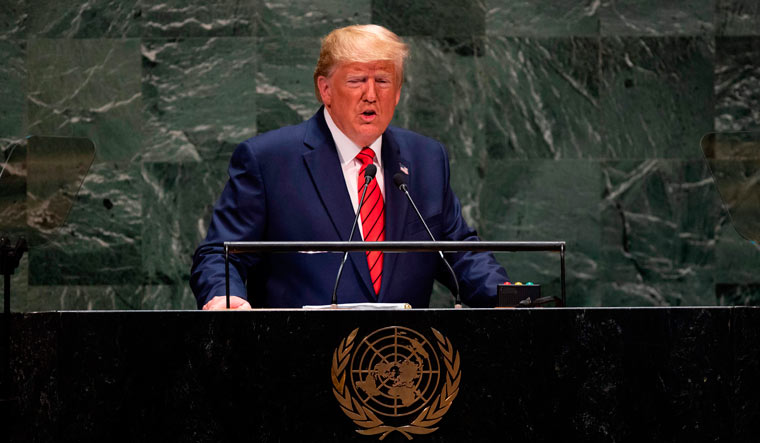Facing growing calls for his impeachment, President Donald Trump addressed the UN General Assembly on Tuesday and delivered a roaring defense of nationalism and American sovereignty even as he tried to rally a multinational response to Iran's escalating aggression.
The president implored the world's leaders to prioritize their own nations, with strong borders and one-on-one trade deals, rejecting sweeping transnational organizations and alliances.
"The future does not belong to globalists. The future belongs to patriots. The future belongs to strong, independent nations," Trump told a murmuring crowd at the General Assembly.
"Globalism exerted a religious pull over past leaders causing them to ignore their own national interests. Those days are over." Focusing on the United States' self-interest, Trump said that the nation's security was jeopardized by the threat posed by Iran and warned Tehran to stop its aggression toward Washington's allies in the Middle East.
Also read
- TikTok ‘goes dark’ in the US shortly before ban, app removed from Google Play, Apple iOS stores, CEO pins hopes on Donald Trump
- Donald Trump’s inauguration: From world leaders to tech giants—here's the list of guests
- DEI initiatives: Is corporate America courting favour with Donald Trump?
- How Martin Luther King Jr’s ‘American Dream’ gave way to Donald Trump’s
"As long as Iran's menacing behavior continues sanctions will not be lifted. They will be tightened," Trump warned.
"The United States does not seek conflict with any other nation. We desire peace, cooperation, and mutual gain with all. But I will never fail to defend America's interests."
As speculation mounted that Trump could meet in New York with Iranian President Hassan Rouhani, the president raised the possibility of a diplomatic breakthrough, saying "the United States has never believed in permanent enemies. We want partners, not adversaries."
But while Trump commanded the global stage, momentum was building in Washington among Democrats to impeach the president after it was revealed that he ordered his staff to freeze nearly USD 400 million in aid to Ukraine a few days before a phone call in which he pressured the Eastern European nation's leader to investigate the family of political rival Joe Biden.
While Trump wants allies to join the U.S. in further isolating Iran, he also seems to be holding to his go-it-alone strategy of using economic sanctions to pressure Tehran to give up its nuclear program and stop attacks that are rattling the Middle East.
In the speech's first moments, Trump did not explicitly to blame Iran for recent strikes against oil facilities in Saudi Arabia. Iran has denied orchestrating the attack, which Secretary of State Mike Pompeo has deemed "an act of war." Britain, France and Germany joined the United States on Monday in blaming Iran for the attacks. Iranian Foreign Minister Mohammad Javad Zarif, for his part, pointed to claims of responsibility by Yemeni rebels and insisted: "If Iran were behind this attack, nothing would have been left of this refinery."
Trump also addressed the ongoing standoff in Venezuela, denouncing the oppressive regime and vowing that the United States would "never be a socialist nation."
The United States and more than a dozen Latin American countries agreed Monday to investigate and arrest associates and senior officials of the Venezuelan government of Nicols Maduro who are suspected of crimes like drug trafficking, money laundering and financing terrorism.
Trump praised his diplomatic efforts with North Korean leader Kim Jong Un, even though the autocrat continues to hold a tight grip on his nuclear weapons.
Trump has met Kim for summits in Singapore and Hanoi, Vietnam, and orchestrated a surprise encounter with him in June at the Demilitarized Zone, where he became the first U.S. president to ever set foot in North Korea.
Trump said Monday that another meeting with the North Korean leader "could happen soon."
He provided few details, and it wasn't clear what officials were doing behind the scenes to set up a meeting to break the diplomatic impasse over the North's development of nuclear-armed missiles targeting the U.S. mainland.
Trump's comments, even with few specifics backing them up, are tantalizing because there is extreme interest, especially in Japan and South Korea, in whether Trump and Kim can strike a deal on one of the world's most pressing standoffs.
This was Trump's third speech to the world body.



